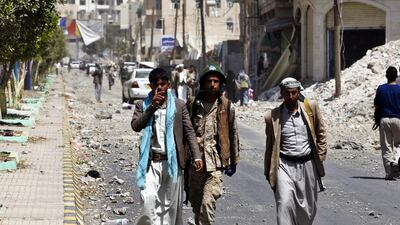Over the past month, a Saudi-led coalition has launched airstrikes on Houthi fighters in Yemen. The formal operation, which ended at midnight on Tuesday, intended to stop the country slipping into a years-long civil war. A new operation began last night with the dual aims of reviving political talks in Yemen and addressing the unfolding humanitarian situation. For it to be effective, it must also directly confront Iran’s meddling influence behind the scenes.
Operation Restoring Hope began against a background of sporadic fighting in Aden, Lajh and Daleh yesterday. Air strikes were also called in on Taez, where Houthis had seized a compound where government forces were based.
Mindful of the continuation of hostilities and the intractable nature of the Houthis, Riyadh has mobilised its elite National Guard troops, which it may send to protect its long border with Yemen. This is a clear message that if carrots fail to achieve a peaceful way out of this conflict, then Saudi Arabia and its allies can use the stick as well.
The onus now rests squarely on Iran’s shoulders. Tehran has repeatedly shown its ability to manipulate war and create trouble in Yemen, but the question is whether Iran is able to manipulate peace on the ground.
Iran wants the Houthis to serve as proxies on the Arabian Peninsula in a similar way that Hizbollah has traditionally done Tehran’s dirty work in Lebanon. With the possibility of sanctions relief on the horizon, Tehran could easily be tempted to strengthen its alliances with the Houthis to gain further strategic influence.
As events in Taez show, the Houthis still pose a serious threat on the ground and there remains some serious questions about their intentions. Will they abide by any deal? And will their backers in Tehran accept any negotiated settlement?
Operation Decisive Storm sent a clear message to Tehran that its meddling will no longer go unanswered in the Arab world. The next phase will be tougher.

